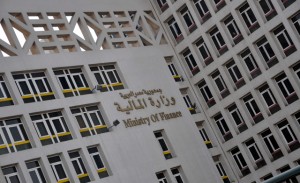
(DNE File Photo)
By Doaa Farid
The budget deficit of Egypt is expected to reach 9.1% of the GDP, during the fiscal budget of the year 2013/2014, to about EGP 186bn, a fall from EGP 204.9bn recorded in the first 11 months of the past fiscal year, the monthly financial report by the Ministry of Finance said.
The report issued on Monday expected that the total revenue of the fiscal year 2013/2014 will reach EGP 505.5bn, where the taxes revenue will amount to EGP 358.7bn, the non-tax revenue EGP 146.8bn and the other revenues will reach EGP 144.4bn. While it is expected that the total expenditure will reach EGP 689.3bn, EGP 171.2bn from them will be for wages and workers’ compensation.
“The 2013/2014 fiscal year’s budget includes a package of measures on the both sides of revenues and expenses that works on redistributing the economy surpluses in a better and fairer way,” according to the finance ministry.
One of the most important measures is expanding the tax base without adding burden on the current tax payer, which aims to achieve a more sufficient tax system. The budget also seeks to rationalise the expenditure of the energy subsidies which serves the high-income class more than the low-income people, and disengage the financial entanglements between different sectors (especially Electricity and Petroleum), according to the report.
The report stated that the international and local current economic conditions may have affected the Egyptian economic performance after the January 25th revolution, by limiting its ability to achieve the desired growth rates, for example, the investment spendings recorded a decline amounted to 3.6% during the first half of the fiscal year 2012/2013.
“Although the investments growth rates have achieved improvement, its contribution to the GDP is still negative with an estimated 0.5% during the first half of the fiscal year under study,” the report stated.
Meanwhile, the percentage of the domestic debt of the general budget devices is raised to reach 80% of the GDP by the end of March, recording EGP 1387.2bn compared to EGP 1089.4bn by the end of March last year.
Since the January 25th Revolution, Egypt has been struggling with its lack of foreign currency reserves. Net foreign reserves shrank by $1.1bn in June, reaching $14.922bn compared to $36bn on the eve of the revolution.
The Central Bank of Egypt announced in May a non-regular tender of $800bn, so as to meet the needs of private banks in order to fund the importing of strategic goods. This extraordinary tender came from the central bank’s following of the foreign market exchange transactions in the country.
The Monetary Policy Committee in the central bank has decided to keep the interest rates at the same level during this month, after it has raised the interest rates during the previous period. This decision came to balance the upward risk inflation and the slowdown of local economy growth.
The report mentioned that the annual inflation rate of urban has rose significantly during June, to record 9.8% compared to 8.2% in May. While the core inflation rate rose to reach 8.6% compared to 8% in the previous month.
The GDP is continuing the gradual improvement but at a slower pace, registering a growth rate of 2.2% during the second quarter of the fiscal year 2012-2013, compared to 2.6% during the first quarter of the same fiscal year.



